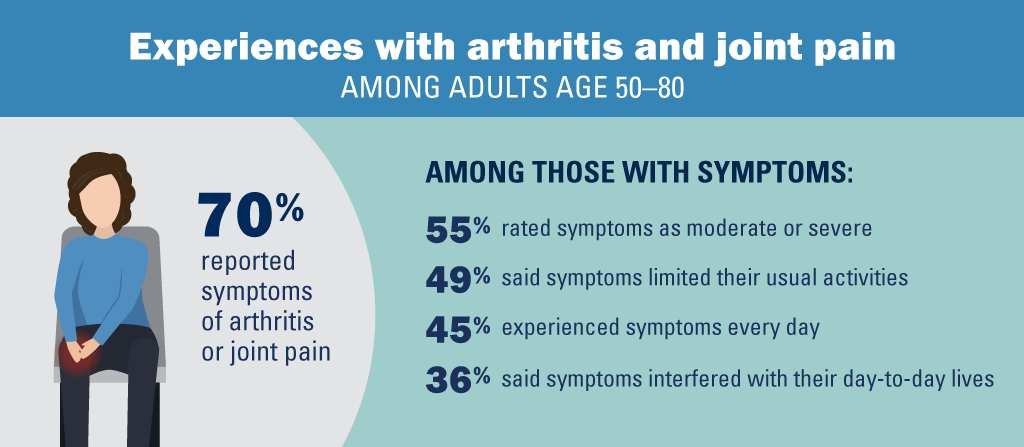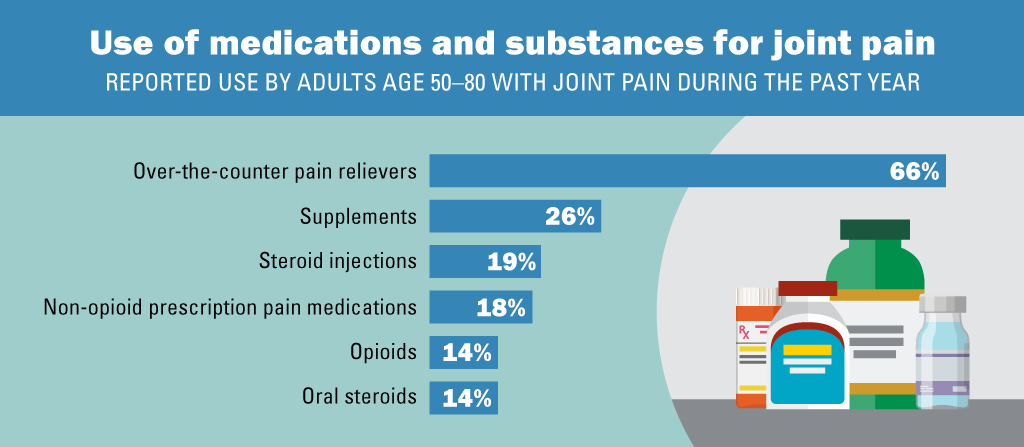70% of Older Adults Report Joint Pain Save

Dr. Beth Wallace and colleagues at the University of Michigan surveyed a national sample of older adults (50–80 yrs) and found that 70% currently report experiencing joint pain and 60% reported being told by a health care professional that they have arthritis.
The University of Michigan National Poll on Healthy Aging was conducted in Jan-Feb 2022 (published September 2022). The prevalence and severity of arthritis in the population was ascertained by online and phone surveys of randomly selected, U.S. adults age 50–80 (n=2,277).The completion rate was 68% among those contacted to participate.
Three in five adults age 50–80 (60%) reported a health care professional diagnosis of arthritis, with 30% reporting osteoarthritis 8% with rheumatoid arthritis, 7% with gout or pseudogout and 5% with another kind of arthritis. Interestingly 29% were told they had arthritis but the HCP was unsure of what type.
Self reported Symptoms. 70% of older adults reported currently experiencing joint pain, moreso in women (75% vs. 65%) and with increasing age (65–80 yrs 74%). Joint pain was reported more in those with lower levels of education, in lower income, and in fair or poor physical or mental health.

Among those with joint pain, 80% were confident (24% very, 56% somewhat) that they could manage their symptoms on their own. However, 18% of older adults believed ‘there is nothing a person with arthritis or joint pain can do to make their symptoms better’ (more so in those with severe and moderate joint pain - 49% severe, 24% moderate, 10% mild).
Treatment. Two-thirds of adults with arthritis or joint pain reported using over-the-counter pain (OTC( relievers like non-steroidal anti-inflammatory drugs (NSAIDs — such as aspirin or ibuprofen) or acetaminophen (Tylenol) for symptoms during the past year. Other treatments used include:
- 26% Supplements (such as glucosamine, chondroitin, turmeric)
- 19% Intra-articular steroid injections
- 18% Non-opioid prescription pain medications
- 14% Oral steroids
- 14% Opioids
- 11% Cannabidiol
- 9% Marijuana
- 4% Disease-modifying anti-rheumatic drugs .

MD Guidance. In those taking two or more arthritis medications in the past year, 40% recalled that their health care provider discussed the risks of medication interactions with them, 53% said their health care provider had not discussed risks, and 7% could not recall.
Among older adults who used oral steroids for joint pain in the past year, 24% took them at least once a month, 38% one or more times per year, and 38% less than once a year. About seven in ten older adults receiving oral steroids for joint pain (71%) had discussed the risks of steroids with their health care provider, 26% had not discussed risks, and 3% could not recall.
Non-pharmacologic treatments. The vast majority of arthritis patients (87%) reported using non-pharmacologic treatments, including exercise (64%), massage (26%), physical therapy (24%), splints or braces (13%), and acupuncture or acupressure (5%). Among these, massage (91%), splints and braces (85%) and exercise (80%) were most often rated as helpful by those who used them.
The authors suggest these findings be used to identify opportunities for more consistent conversations among older adults and their health care providers about safe and effective treatments for joint pain. Moreover, providers should periodically review the patients use of prescription and over-the-counter medications to discuss risk, benefits and options.
Citation. Wallace B, Singer D, Kullgren J, Kirch M, Solway E, Smith E, Hutchens L, Malani P. Arthritis and Joint Pain. University of Michigan National Poll on Healthy Aging. September 2022. Available at: https://dx.doi.org/10.7302/6410
Join The Discussion
My comment is that there are so. Any people who have experienced arthritic pain long before becoming 50-70 years old. Point in case; there are many people suffering from rheumatic disease well before they hit that age. I amone of them. I am 64 and I have had Rheumatoid Arthritis for 49 years going on 50. What I want these people to know is that NSAIDs can wreak havoc on your gut flora and not many doctors tell you that when they prescribe them for long term use. Just warn them what these meds can do to you! I have suffered immensely from them.
PS. I’m a retired RN who as had RA x50yrs.










If you are a health practitioner, you may Login/Register to comment.
Due to the nature of these comment forums, only health practitioners are allowed to comment at this time.